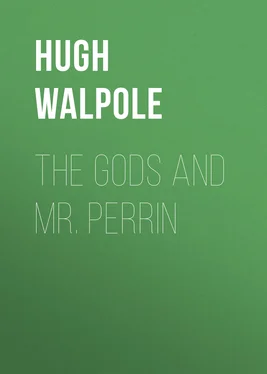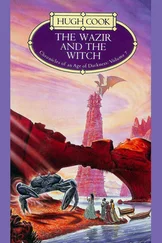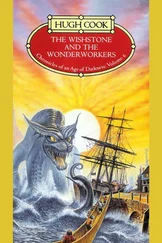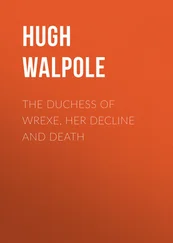Hugh Walpole - The Gods and Mr. Perrin
Здесь есть возможность читать онлайн «Hugh Walpole - The Gods and Mr. Perrin» — ознакомительный отрывок электронной книги совершенно бесплатно, а после прочтения отрывка купить полную версию. В некоторых случаях можно слушать аудио, скачать через торрент в формате fb2 и присутствует краткое содержание. Жанр: foreign_dramaturgy, foreign_antique, foreign_prose, на английском языке. Описание произведения, (предисловие) а так же отзывы посетителей доступны на портале библиотеки ЛибКат.
- Название:The Gods and Mr. Perrin
- Автор:
- Жанр:
- Год:неизвестен
- ISBN:нет данных
- Рейтинг книги:3 / 5. Голосов: 1
-
Избранное:Добавить в избранное
- Отзывы:
-
Ваша оценка:
- 60
- 1
- 2
- 3
- 4
- 5
The Gods and Mr. Perrin: краткое содержание, описание и аннотация
Предлагаем к чтению аннотацию, описание, краткое содержание или предисловие (зависит от того, что написал сам автор книги «The Gods and Mr. Perrin»). Если вы не нашли необходимую информацию о книге — напишите в комментариях, мы постараемся отыскать её.
The Gods and Mr. Perrin — читать онлайн ознакомительный отрывок
Ниже представлен текст книги, разбитый по страницам. Система сохранения места последней прочитанной страницы, позволяет с удобством читать онлайн бесплатно книгу «The Gods and Mr. Perrin», без необходимости каждый раз заново искать на чём Вы остановились. Поставьте закладку, и сможете в любой момент перейти на страницу, на которой закончили чтение.
Интервал:
Закладка:
Traill stared at the little man’s burning eyes. How odd of Birkland to talk like this!
“You think you will escape, but already the place has its fingers about you. You will be a different man at the end of the term. You will be allowed no friends here, only enemies. You think the rest of us like you. Well, for a moment perhaps, but only for a moment. Soon something will come… already you dislike Perrin. You must not be friends with the Head, because then we shall think that you are spying on us. You must not be friends with us, because then the Head will hear of it and will immediately hate you because he will think that you are conspiring against him. You must not be friends with the boys, because then we shall all hate you and they will despise you. You will be quite alone. You think that you are going to teach with freshness and interest—you are full of eager plans, new ideas. Every plan, every idea, will be immediately killed. You must not have them—they are not good for examinations—you are trying to show that you are superior.”
Birkland paused. Traill moved uneasily in his chair.
“Wait! You must hear me out. It all goes deeper than these things. It is murder—self-murder. You are going to kill—you have got to kill—every fine thought, every hope, that you possess. You will be laughed at for your ambitions, your desires. You will not even be allowed any fine vices. You must never go anywhere, because you are neglecting your work. You have no time. Here we are—fifteen men—all hating each other, loathing everything that the other man does—the way he eats, the way he moves, the way he teaches. We sleep next door to each other, we eat together, we meet all day until late at night—hating each other.”
“After all,” said Traill, still smiling, “it is only a month or two, and there are holidays.”
“If term lasted another week or two,” went on Birkland quietly, “murder would be committed. The holidays come, and you go out into the world to find that you are different from all other men—to find that they know that you are different. You are patronizing, narrow, egotistic. You realize it slowly; you see them shunning you—and then back you go again. God knows, they should not hate us—these others! they should pity us. If you marry, see what it is—look at Mrs. Dormer, Mrs. Comber, Mrs. Moy-Thompson. Look at their husbands, their life. There is marriage—no money, no prospects, perhaps in the end starvation! And gradually there creeps over you a dreadful and horrible inertia: you do not care—you do not think—you are a ghost. If one of us dies, we do not mind—we do not think about it. Only, towards the end of the term, when the examinations come, there creeps about the place a new devil. All our nerve is gone; our hatred of each other begins to be active. It is the end-of-termy devil.... Another week or two, and there is no knowing what we might do. We are all tired, horribly tired. Be careful then what you do and what you say.”
“My word!” said Traill, filling his pipe, “what a horrible picture of things! You must be out of sorts. Why, it’s hysteria!”
Birkland had crawled back into his chair again. He puffed at his pipe.
“Oh! of course you don’t see it!” he said. “After all, why should you? But it’s true, every word of it. Oh! I’m resigned enough now. Besides, it’s the beginning of the term. I’m inclined to think it’s untrue, myself, just now. Wait and see. Watch White after he’s had an interview with the Head—see Perrin and Comber together later on—study Mrs. Comber. But don’t you bother. You won’t listen to me—why should you? Only, in ten years’ time you ‘ll remember.”
After that they talked of other things. Birkland was rather amusing in his sharp, caustic way.
“I say,” said Traill as he stood by the door on the way out, “that was all rot; was n’t it?”
“What was?” asked Birkland.
“Why, about the place—this place.”
“All rot!” said Birkland gravely.
But of course one dismisses these things very soon—especially, and immediately, if the person in question is Archie Traill.
Why think about a problematic and depressing forty? Take these men that Birkland so gloomily points to as disappointing and unsatisfactory exceptions. Life is like that. There are always the riders who collapse into ditches and sit there mumbling, wishing for the company, down in the dirt and the grime, of their fellow-horsemen.
Meanwhile there is this fine autumn weather. Birkland remains a crabbed shadow; life is sharp, pungent—formed with faint blue skies, dim and shining like clear glass with a hard yellow sun stuck like a tethered balloon between saucer-clouds.
Archie Traill, on a free afternoon—an early frost had made the ground too hard for football—in the week after that Birkland evening, stood in the village street as the church clock struck half-past three, and he thanked God for a half-holiday.
The air was so still that the distant mining stamps and the breaking sea had it for the plain of their unceasing war, cannon against cannon, and the withdrawing rattle of their rival shot echoing against the blue horizon and the stiff side of the Brown Hill. The village cobbles shone and glittered; the gray roofs lay like carpets spread to dry. The brown church tower seemed to sway—so motionless was the rest of the world—with the clatter of its chiming clocks.
Suddenly Isabel Desart turned the corner. “Good afternoon, Mr. Traill,” and the clasp of her hand was strong and clean as all the rest of her movements. She smiled at him as she always smiled, a little ironically and also a little seriously, as though she found the world a strange place, ought to think it a solemn one, but couldn’t help finding it funny.
Three old women, their skirts kilted about them, their eyes fixed on vacancy, flung their voices into the silence like balls against a board.
“And she only sixteen—what a size!”
“Only sixteen!—to think of it!”
“With her great legs and all!”
“Only sixteen…!”
The man and woman moved up the road together. She was usually so full of things to say that her silence surprised him. The thought that his presence could possibly be agitating to her, and therefore responsible, drove the blood to his head, and then he rebuked himself for a presumptuous fool. But if he had spoken, he would have had to tell her that he loved her—and it was n’t time yet.
But at last he broke against the silence very quietly. “We must talk, one of us—it is so wonderfully quiet that it’s alarming.”
She turned round to him, and suddenly, so that he stopped in the road and looked at her, she put her hand on his arm.
“We are both so frightfully young,” she said.
“Why, yes,” he said, laughing at her; “but why not?”
“Why, for the things that we ‘ll have to do. You for the boys, and I for my poor Mrs. Comber. I had thought when I saw you first that you were going to be old enough, but I don’t think you are.”
“I know that I can’t—” he began.
“Oh! it isn’t for anything that you can’t do!” she broke in. “It’s just because you don’t see it—why should you? You ‘re too much in the middle—I suppose it’s only outsiders who can really understand. But I get so depressed sometimes with it all that I think that I will leave it and go back to London and never come here again. One doesn’t seem to be any use—no use at all. And it all seems worse in the autumn somehow. Poor Mr. Traill! I always happen to be gloomy when you catch me, and I’m not gloomy really in the least.”
“But what is it all about? And don’t go to London, please. You mustn’t think of it.”
He was so much in earnest that she turned and looked at him. “Why?” she said gravely. “Do you like my being here?” And then, before he could say anything, she added, reflectively, “Well, that’s one, at any rate.
Читать дальшеИнтервал:
Закладка:
Похожие книги на «The Gods and Mr. Perrin»
Представляем Вашему вниманию похожие книги на «The Gods and Mr. Perrin» списком для выбора. Мы отобрали схожую по названию и смыслу литературу в надежде предоставить читателям больше вариантов отыскать новые, интересные, ещё непрочитанные произведения.
Обсуждение, отзывы о книге «The Gods and Mr. Perrin» и просто собственные мнения читателей. Оставьте ваши комментарии, напишите, что Вы думаете о произведении, его смысле или главных героях. Укажите что конкретно понравилось, а что нет, и почему Вы так считаете.











